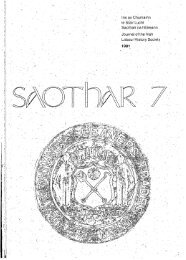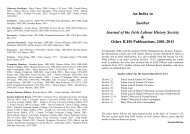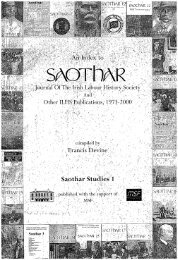Essays'Godliness and Good Citizenship': Evangelical Protestantism andSocial Control in Ulster, 1790-1850Elie Halevy's famous thesis that the growth of evangelical Protestantism made a substantialcontribution to English social stability during the period of the industrial revolution by imbuing upperand middle class Englishmen with a new sense of moral duty to the poor, and by channelling workingclass energies into politically safe forms, has occasioned a remarkably prolific historiographicaldebate.! The range of interpretations is, of course, bewildering and ultimately owes as much toideological disagreements about the nature of religion itself as it does to different methods ofinvestigation. But in general terms one can state that the pioneering work of E.P. Thompson and EricHobsbawm in the 1950s and 1960s was concerned primarily with the relationship between evangelicalreligion (particularly Methodism) and the development - or lack of it - of political and classconsciousness. 2 This controversy is far from over, as the recent work on the contribution of religionto the factory culture of nineteenth century Lancashire has shown,3 but increasingly the debate hasshifted away from the role of religion in the social structure to the actual content, meaning andexperience of popular religion within a wider social environment. 4 This work has shown that popularreligion cannot always be understood as a mere solvent of class tensions but rather has the capacity torelate to the wider concerns of ordinary people including home and family life, community morality,social and ethnic identity, literacy and education, self-improvement and respectability, work andleisure, and the development of political consciousness. sIn Ireland the impact of evangelical religion has been considered almost exclusively in terms of itscontribution to internal denominational conflicts or to sectarian animosities in society as a whole. 6Thus the problems of ecclesiastical discipline posed by evangelicals within the Church of Ireland andthe debates within Irish Presbyterianism in the 1820s have been well documented, as has the evangelicalcrusade into Catholic Ireland by the so-called Second Reformation movement. 7 A remarkableresurgence of interest in the history of Irish evangelicalism in the past decade has considerablyexpanded our knowledge of these areas without challenging the old agenda of priorities. s What has beensingularly lacking, with a few notable exceptions, has been a serious attempt to understand the impactof a multi -or even non-denominational evangelicalism on nineteenth century Irish society, particularlyin Ulster where it made its greatest gains. This is all the more remarkable since it is widely acceptedamong historians and sociologists that no other part of the British Isles, not even South Wales, theScottish Highlands and South West England, has been shaped so strikingly by evangelical religion asthe province of Ulster. 9There are, of course, usually good reasons for historiographical gaps and this one is no exception.Mostreligious records in Ireland have been collected and preserved by either the various denominationsor crypto-religious organisations like the Orange Order. This institutional and clerical bias makes itdifficult to uncover the beliefs and practices of ordinary men and women, especially the latter. Sucha project faces formidable obstacles and is clearly beyond the scope of a short essay like this. Our moremodest and strictly limited aim, therefore, is to look at some of the ways in which the distinctive ethosof evangelical religion was transmitted to working people during a period of rapid social and economicchange from a predominantly agrarian to a growing industrial society between 1790 and 1850, and toraise some questions which clearly need further attention.Space does not permit a lengthy discussion of either the theology of evangelicalism or its mostcharacteristic organisational forms. Suffice to say that by evangelicalism we mean that conversionist,biblicist, activist and cross-centred type of popular Protestantism which is to be seen most clearly inearly Methodism, Presbyterian secession churches and a host of voluntary associations dedicated to68
ESSAYS 69mission and moral refonn.lo Preoccupied with sin and its multitudinous social expressions, evangelicalsoffered personal regeneration and social improvement. Though intensel y individualistic, evangelicalswere also capable of grasping a wider social purpose and therein lies many of their emotionalstrengths and unresolved ambiguities~ But, for good or for ill, and there was a good deal of both inevangelicalism, this organisationally pragmatic and emotionally volatile fonn of religion made asubstantial contribution to the lives oflarge numbers of Ulster men and women even before the muchmisunderstood revival of 1859. How this was achieved and with what consequences are the questionsto which we must now turn.The complex inter-relationship between religious expression and popular culture suggests that thefull extent of religious influence cannot be measured purely in terms of church attendance orinvolvement in specifically religious exercises. Thus, while the actual number of adherents to acommitted evangelical lifestyle was always a minority in terms of percentage of population, its socialideology penetrated deep into Ulster culture. In times of political insecurity and social stress,evangelicalism's strong emphasis on personal morality and its conservative social code came to be seenas major stabilising factors. Against a background of rising Catholic nationalism, radical politics,secularisation and industrialisation, aristocrats, employers, clergy, churchmen and women, imbuedwith evangelical seriousness, attempted to propagate a scripture-based culture which upheld social andpolitical stability. Their target was the spiritual regeneration and' moral elevation' of the lower classesof society, and their weapons were temPerance, education, sabbatarianism, charity and moral campaignsunlimited. Through new agencies such as Sunday schools, temperance movements, townmissions, tract and Bible societies, as well as more traditional modes of control, evangelical leaderssought to promote 'higher and nobler ideals of life'. From pulpit and press, attacks were launched ona whole range of traditional leisure-time activities - drinking, dancing, theatre-going, cockfighting andboxing. This pietistic campaign was thus a combination of cultural conflict and social control in whichpublic respectability was generally interpreted as a reflection of personal morality. The extent whichthese were in fact synonymous is highly debatable.In Ireland, at least before the mid-nineteenth century, the part played by the landed aristocracy intenns of organisation, leadership and finance was an important element in the campaign for moralrefonnation. Their enthusiasm for this new type of religious experience can only be understood in thecontext of the post -revolutionary shock -waves experienced by all western European societies in the lateeighteenth, early nineteenth centuries." The Reign of Terror was a stark indicator of the transience ofworldly things, and in Ireland the stability of long-held privileges was shaken both by developmentsin the rural economy, and by the rise of Catholic nationalism. Evangelical landlords, for whom political,social and moral issues were inextricably interwoven, utilised their wealth, prestige and personalinfluence in the furtherance of a creed which offered both personal and constitutional reassurance. Thesize of their holdings, in addition to their marital interconnections and contacts with evangelical andpolitical leaders in England, gave them a strong power base and ensured their extensive influencePFor aristocratic landlords such as the Earls of Roden, Farnham, Mandeville and Gosford, the dailyroutine of life was dominated by the duties and responsibilities of their pietistic faith.13 Scriptural rulegoverned not only their personal and family lives, but determined their relations with local tenantry.For these men the extension of their own religious beliefs was not a matter of choice or politicalpragmatism, but a sacred responsibility, and one which required personal intervention in areas such asBible instruction and Sunday school work. Their paternalism was not, however, limited to the provisionof religious facilities on their estates. The system of 'moral management', giving secular expressionto the evangelical idea of responsibility for the salvation of one's fellow man, was introduced by LordFarnham in his county Cavan estate in 1830, and subsequently came into operation in several ofIreland's largest estates, and in many smaller ones. 14 Farnham explained the foundation of his systemas 'the religion of the Bible, and the principles upon which it is built up' .15 In return for the landlord'sprovision of churches, day schools, Sunday schools, a lending library, and material aid for those whoearned it, the tenant was expected to respond with· punctual payment of rent, hard work, and a
- Page 1 and 2:
JOURNAL OF THE IRISH LABOUR HISTORY
- Page 3 and 4:
ContentsPageEditorial: Labour Histo
- Page 5 and 6:
EDITORIAL 3freedom to participate i
- Page 7 and 8:
CorrespondenceThe Irish Labour Part
- Page 9 and 10:
; ~ ; ,The Decline and Fall of Donn
- Page 11 and 12:
THE DECLINE AND FALL OF DONNYBROOK
- Page 13 and 14:
THE DECLINE AND FALL OF DONNYBROOK
- Page 15 and 16:
·' THE DECLINE AND FALL OF DONNYBR
- Page 17 and 18:
THE DECLINE AND FALL OF DONNYBROOK
- Page 19 and 20: THE DECLINE AND FALL OF DONNYBROOK
- Page 21 and 22: THE DECLINE AND FALL OF DONNYBROOK
- Page 23 and 24: THE DECLINE AND FALL OF DONNYBROOK
- Page 25 and 26: ,'-,;-''''.A PASSAGE TO BRITAIN 23C
- Page 27 and 28: A PASSAGE TO BRITAIN 25only in the
- Page 29 and 30: A PASSAGE TO BRITAIN 27clothing._De
- Page 31 and 32: A PASSAGE TO BRITAIN 29established
- Page 33 and 34: ;:-.",.- .. .", ...... '.:. '
- Page 35 and 36: LOUIE BENNETI 33feminist movement w
- Page 37 and 38: :... ~: ."
- Page 39 and 40: -.- '.LOUlE BENNETT 37While there i
- Page 41 and 42: LOUIE ~ENNEIT 39Xl's encyclical Qua
- Page 43 and 44: LOUIE BENNEIT 41Bennett's own relat
- Page 45 and 46: LODIE BENNETT 43109; IWWU resolutio
- Page 47 and 48: Essays in ReviewCosherers, Wanderer
- Page 49 and 50: ••• .".'. >. '~"ESSA YS IN RE
- Page 51 and 52: ESSAYS IN REVIEW 49ConnolIy:Myth an
- Page 53 and 54: ESSAYS IN ~EVIEW 51tion' in the Int
- Page 55 and 56: ESSAYS IN REVIEW53International:'I
- Page 57 and 58: REVIEWScontroversy is real history.
- Page 59 and 60: REVIEWSJoe Monks was among the earl
- Page 61 and 62: REVIEWSnolly-Column Song','Proudly
- Page 63 and 64: REVIEWSresulting from the arrival o
- Page 65 and 66: REVIEWS,63the book by means of an a
- Page 67 and 68: REVIEWSlogue, it is hardly surprisi
- Page 69: The Team For All Workers ...CULIAIB
- Page 73 and 74: .. ...... ~.~ -~ .'- '.ESSAYS. 71fr
- Page 75 and 76: ESSAYS 73claimed authority but whic
- Page 77 and 78: ESSAYS 75provided the basis for soc
- Page 79 and 80: ESSAYS 779. For comparisons see E.T
- Page 81 and 82: ESSAYS 7952. Annals of Christ Churc
- Page 83 and 84: ESSAYS' 81Fianna Fail and the Worki
- Page 85 and 86: ESSAYS 83Eireann in 1925 visibly di
- Page 87 and 88: ESSAYS 85recognition of the impract
- Page 89 and 90: ESSAYS 871970, it created the condi
- Page 91 and 92: ESSAYS89The Irish Immigrants' Contr
- Page 93 and 94: ESSAYS" 91Although anti -Catholic p
- Page 95 and 96: ESSAYS 93McCowie played a key role
- Page 97 and 98: :. -,,'.' ',. .~.,:.ESSAYS 95Althou
- Page 99 and 100: ESSAYS 97young girl of their own ba
- Page 101 and 102: SourcesIrish Labour History Society
- Page 103 and 104: SOURCES 101INovember, 1971 to no. 1
- Page 105 and 106: SOURCES 103would claim credit for t
- Page 107 and 108: SOURCES105Sources for Irish Labour
- Page 109 and 110: SOURCES 107NorthWest Archives and L
- Page 111 and 112: SOURCES 109In 1966 the Finnish gove
- Page 113 and 114: TURNINGANEWLEAFThe CPSSUis the larg
- Page 115 and 116: REMINISCENCE 113us due to my politi
- Page 117 and 118: REMINISCENCE 115when Jim was presen
- Page 119 and 120: REMINISCENCE 117of Dail Eireann. 17
- Page 121 and 122:
REMINISCENCE 119NotesThe above arti
- Page 123 and 124:
DOCUMENT STUDY 121James Connolly in
- Page 125 and 126:
DOCUMENT STUDY123SOCIAL DEMOCRATIC
- Page 127 and 128:
DOCUMENT STUDY 125proletariat of th
- Page 129 and 130:
DOCUMENT STUDY 127the support of Je
- Page 131 and 132:
DOCUMENT STUDY 12926. The Workers'
- Page 133 and 134:
131BibliographyA Bibliography of Ir
- Page 135 and 136:
BIBLIOGRAPHY 133Compton, P.A. Demog
- Page 137 and 138:
BIBLIOGRAPHY 135Levine, I. and Madd
- Page 139 and 140:
BIBLIOGRAPHY 137Turner, M. 'Towards
- Page 141 and 142:
BIBLIOGRAPHY 1394. Land and Agricul
- Page 143 and 144:
BIBLIOGRAPHY 141Clogher Record12 (2
- Page 145 and 146:
BIBLIOGRAPHY 143Political Research
- Page 147 and 148:
BIBLIOGRAPHY 145Pres, 1987.O'Brien,
- Page 149 and 150:
147Notes on Contributorsf onathanBe
- Page 151 and 152:
1901: Ireland's first general union
- Page 153 and 154:
ELECTRICAL TRADES UNION .Establishe





